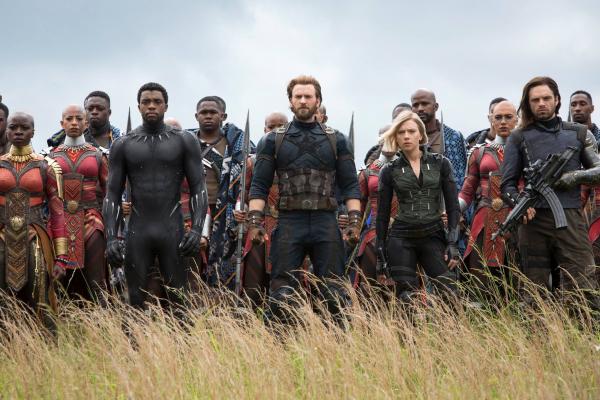It’s all been leading up to this.
Practically since its announcement, Avengers: Infinity War has had fans, bloggers, and writers alike buzzing with theories about how this climactic chapter in the Marvel Cinematic Universe would end. Which of Earth’s Mightiest Heroes would make it out to live in another sequel? What state would the planet (the galaxy, even) be in when the dust settled? And just how bad could Thanos, the movie’s giant purple space tyrant, actually be?
Without spoiling anything that hasn’t already been discussed, Infinity War states its intentions very early on, and mostly sticks to them: this is not going to be a purely fun outing. Characters you love are going to die. The heroes we’ve been rooting for all these years may not always end up on the winning side. And the big bad? He’s more complex (and more threatening) than we thought.
Previous Avengers movies were about the challenges of building and sustaining and a community. Infinity War is a sobering reminder that even the biggest, strongest communities sometimes face adversity that results in sacrifice, uncertainty, and loss. This is the MCU’s equivalent of C.S. Lewis’ The Last Battle, gathering characters both beloved and new, and throwing them into a brutal endgame. It’s a Good Friday movie, too, putting those left standing at the end into their own version of Gethsemane.
Thanos (Josh Brolin) is an intergalactic warlord who seeks five infinity stones (the time stone, the mind stone, the reality stone, the power stone, the space stone, and the soul stone) to complete the Infinity Gauntlet, a weapon that gives the wearer control of the universe. Thanos wants to use the gauntlet to wipe out exactly half of life across the galaxy. The meat of the plot involves the Avengers and the Guardians of the Galaxy meeting up and joining forces after Thanos shows up on Earth in search of the time stone, possessed by Doctor Strange (Benedict Cumberbatch) and the mind stone, possessed by Vision (Paul Bettany).
Infinity War has a crowded field of characters, and often strains under the weight of its massive ensemble. But it’s to directors Joe and Anthony Russo’s credit that the film manages to make any kind of sense, or, for a little while anyway, that it maintains the irreverent tone and love for its characters that’s come to define the franchise. For a good portion of the runtime, we get new character pairings and groups going off on missions together. Some of those experiments don’t pay off (Infinity War also highlights just how much character dead weight the MCU has produced). But when those pairings work, they’re delightful.
As for Thanos, Infinity War gives him a backstory and a mission that infuses the character with a surprising amount of sympathy. He’s not, as it turns out, totally evil. Instead, he’s that most dangerous of villains: one who wholeheartedly believes that he’s doing the right thing. Thanos is on a crusade, and the film treats his arc as such. He’s still a ruthless character, but Infinity War makes the smart choice of making him less of a monolith, and more relatable.
All of those character explorations and relationships both new and established make the film’s final battle that much more heartbreaking. Friends lose friends, mentors lose protégés, and lovers are separated. The resulting world is left in utter chaos, with the outcome uncertain. We leave our heroes in a moment when all hope seems lost.
But we know that hope still exists. For one thing, Marvel’s got more movies in the works. But more importantly, Infinity War is part of a story tradition that follows the same pattern — one that goes all the way back to the Bible. Characters setting out to change the world experience success and transformation, then darkness to the point that it seems light will never come again. Biblically, we know what happens — Jesus is crucified, then there’s resurrection, and a world rescued and transformed. In Marvel terms, we know the second half of Infinity War is coming next year, with movies introducing new characters on the way. This story isn’t over yet, and there’s reason to believe the pain of this entry will make way for victory and new growth in stories to come.
Got something to say about what you're reading? We value your feedback!







